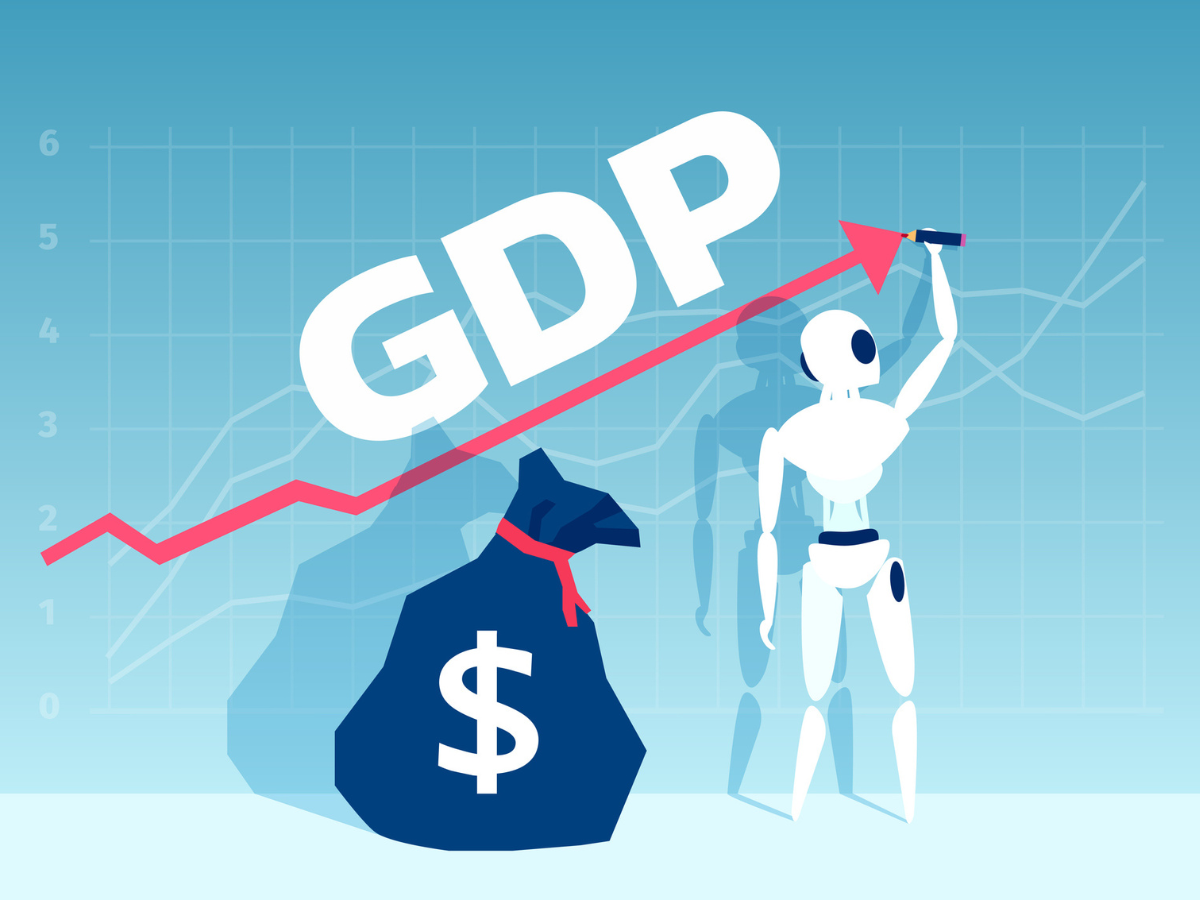Gen AI Projected to Increase India’s GDP by $1.5 Trillion: Are Indian Businesses Prepared for Generative AI Revolution?
Gen AI has the potential to increase $1.5 Trillion to India’s GDP, however, Indian businesses according to the recent report might not be prepared.

Gen AI Projected to Increase India’s GDP by $1.5 Trillion: Are Indian Businesses Prepared for Generative AI Revolution?
According to a recent report by EY, Gen AI, or generative artificial intelligence, is expected to drive economic growth in India, adding between USD 1.2 and 1.5 trillion to the country’s GDP over the course of the next seven years.
The EY report, titled “AIdea of India: Generative AI’s potential to accelerate India’s digital transformation,” predicts that if Gen AI technology is completely adopted across a broad spectrum of industries, India’s economy will grow significantly. It projects that Gen AI might boost India’s GDP by an additional USD 359–438 billion by the fiscal year 2029–2030 alone. This indicates a significant growth above the baseline GDP of 5.9 to 7.2%.
Key Sectors Driving Growth
According to the report, around sixty-nine percent of the impact of Gen AI on India’s GDP is anticipated to originate from key sectors such as business services (which includes IT, legal, consulting, outsourcing, and rental of machinery and equipment, among others), financial services, education, retail, as well as healthcare.
“Organisations are swiftly adopting an AI-first approach to digital transformation, aiming to enhance customer engagement, increase productivity, and achieve greater agility in delivering digital capabilities using innovative foundation models and AI-first solutions.”
– Mahesh Makhija, technology consulting leader, EY India.
However, despite the potential benefits which are highlighted, the report reveals that 75 per cent of businesses in India express a low to moderate level of readiness to harness the benefits of Gen AI. A significant 52 per cent identify a skills gap as a primary challenge, emphasizing the urgent necessity to upskill the workforce in our country.
In addition to this, 42 per cent of respondents find the availability of clear use cases to be another hurdle. To foster Gen AI innovation, the report suggests implementing measures such as enabling access to training data and marketplaces, deploying Gen AI systems as Public Goods, securing critical digital infrastructure, as well as providing access to talent and public funding for research along with development.
Data Privacy Concerns
On the data privacy front, the report details that 36 per cent of organisations see data privacy as the single most important risk which has been connected to Gen AI. This is followed by concerns related to hallucination or fabricated answers (24 per cent), biased responses (21 per cent), as well as cybersecurity (16 per cent).

Customer Engagement and External Partnerships
The report additionally underscores that 75 per cent of organisations consider customer engagement as the segment which has been most influenced by generative AI. Furthermore, 73 per cent prefer partnering with external tech providers for Gen AI implementation.
Global Initiatives and Regulatory Framework
Given Gen AI’s potential as a catalyst of economic growth, the report says that governments throughout the world are aggressively taking into consideration policies to encourage as well as regulate AI. It highlights the significance of a responsive regulatory system that balances innovation and management of risks. To develop confidence in AI systems, key ideas involve setting up regulatory sandboxes, watermarking Gen AI content, as well as establishing rules for accountability and liability.
The survey, with participation from 200 C-suite participants from many different sectors such as technology, media and entertainment, financial services, government, health, retail, and manufacturing, found that almost 60% of these companies recognized the influence of Gen AI on their businesses.
As India stands at the cusp of a Gen AI-driven digital transformation, the report gives an overall suggestion that proactive measures, innovative solutions, and a collaborative approach are necessary to unlock the full potential of generative artificial intelligence in the nation’s economic landscape.
Is India Ready for the Gen AI Revolution? Challenges and Opportunities
As the nation braces for the transformative impact of Generative Artificial Intelligence on its economic and financial landscape, there exists a pressing question: Is the country adequately prepared for the imminent revolution? The report sheds focus on the preparedness of Indian businesses, revealing both challenges as well as opportunities in harnessing the full potential of Gen AI-
- Limited Preparedness Across Businesses- The report displayed that a significant 75 per cent of Indian businesses demonstrate limited preparedness to capitalize on Gen AI. Despite the promising projections of Gen AI adding USD 1.2-1.5 trillion to India’s GDP over the next seven years, a substantial portion of the business landscape appears to be under-equipped to navigate the intricacies which will come along this technological revolution.
- Skills Gap: A Major Hurdle- One of the prominent challenges highlighted in the report is the skills gap, with 52 per cent of organisations identifying it as a big obstacle to harnessing Gen AI capabilities. This underscores the urgent need for upskilling the workforce to meet the evolving demands of the digital era. Bridging this gap is crucial for businesses to fully leverage the potential advantages that Gen AI offers across different sectors.
- External Partnerships Preferred for Implementation- In an important finding, 73 per cent of organisations express a preference for partnering with external tech providers for Gen AI implementation. This points towards a strategic approach among businesses, acknowledging the expertise and resources that external partners bring to the table. Collaboration with tech providers can potentially expedite the integration of Gen AI into existing workflows as well as enhance the overall efficiency of digital transformation initiatives.
While the potential economic impact of Gen AI on India is very significant, the country stands at a critical juncture in its preparedness for this transformative technology. The challenges posed by the skills gap along with the need for external partnerships underscore the importance of a collaborative as well as proactive approach.
With strategic investments, targeted educational reforms, and a conducive regulatory environment, India has the opportunity to not only embrace but thrive in the era of Generative Artificial Intelligence. The upcoming years will likely determine how effectively businesses and policymakers navigate the Gen AI landscape, unlocking its highest potential for sustainable growth and innovation in the country.

Embracing Gen AI – India’s Path to Innovation and Growth
In the wake of the groundbreaking revelations outlined in the report, it is very clear that Generative Artificial Intelligence holds the key to a transformative future for India’s financial landscape. The projected addition of USD 1.2-1.5 trillion to the nation’s GDP in less than a decade presents an unprecedented opportunity for growth, innovation, as well as enhanced productivity. The anticipated impact of Gen AI extends far beyond economic figures, promising a revolution in workforce productivity, operational efficiency, along with customer engagement. Sectors such as business services, financial services, education, retail, and healthcare are poised to become the primary drivers of this digital transformation.
However, the report also serves as a reality check, highlighting the challenges which need to be addressed for India to fully capitalize on this potential of Gen AI. The skills gap, identified by 52 per cent of organisations, emerges as a pressing concern, emphasizing the urgent need for upskilling initiatives in order to equip the workforce for the demands of the upcoming full digital era. While 75 per cent of businesses express limited preparedness, the preference for external partnerships (73 per cent) showcases a strategic understanding of the role that collaboration with tech providers can play in successful Gen AI implementation.
As India navigates this transformative landscape, a harmonious collaboration between the public as well as private sectors, along with educational institutions, is important. The government’s active involvement in creating a conducive regulatory environment, fostering skill development programs, and promoting innovation through funding and market access will be pivotal. The road ahead necessitates a delicate balance – a ‘light touch’ regulatory approach that encourages innovation while managing risks. Establishing regulatory sandboxes, setting standards for accountability, as well as addressing concerns such as data privacy are crucial steps towards building trust in Gen AI systems.
India stands at the threshold of a new era, one which proudly demands foresight, collaboration, as well as decisive action. Gen AI is not merely a technological advancement; it is a catalyst for economic growth, societal progress, and global competitiveness. The upcoming years will undoubtedly shape how India harnesses the power of Generative Artificial Intelligence, unlocking its full potential for a brighter and more innovative future.




